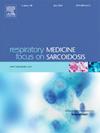Probiotics: An adjuvant treatment strategy for chronic respiratory diseases
IF 3.1
3区 医学
Q2 CARDIAC & CARDIOVASCULAR SYSTEMS
引用次数: 0
Abstract
Chronic respiratory disease is considered by reduced airflow and heightened airway inflammation, a pattern that has progressively increased in past few decades. Currently, chronic respiratory disease is considered one of the main leading causes of death worldwide. The gut-lung axis, which connects these two organs, facilitates bidirectional communication and may be influenced by microbiome populations in the context of disease interactions. The human microbiome, particularly in the gastrointestinal tract is thought to play a pivotal role in affecting diseases and maintaining homeostasis. Dysbiosis, defined as an imbalance in the gut microbiota, is associated with an elevated risk of lung infections. Studies have shown that modifying the gut microbiota by the use of probiotics, prebiotics, and synbiotics can reduce the duration and extent of respiratory infections. Probiotics have been observed to significantly alter serum cytokine and IgE levels in allergic conditions, as well as reduce eosinophilia in individuals with asthma. However, there has been no discernible improvement in clinical symptoms, although this approach may diminish eosinophilia in chronic obstructive pulmonary disease (COPD) patients and mitigate serum cytokine and IgE levels. Several factors such as illness severity, treatment duration, patient-specific, environmental characteristics, and treatment regimen seem to influence the effectiveness of these interventions. Research indicates that direct interaction and colonization of respiratory epithelial cells by probiotic microbes can enhance the success of intranasal probiotic delivery compared to oral administration. Although allergic rhinitis is a chronic inflammatory ailment, nasal probiotics have been utilized to address acute infections and respiratory disorders, offering a promising therapeutic avenue for a range of chronic inflammatory conditions.

益生菌:慢性呼吸道疾病的辅助治疗策略
慢性呼吸道疾病被认为是气流减少和气道炎症加剧,这种模式在过去几十年中逐渐增加。目前,慢性呼吸道疾病被认为是全世界主要的死亡原因之一。连接这两个器官的肠-肺轴促进双向交流,并可能在疾病相互作用的背景下受到微生物群的影响。人类微生物群,特别是胃肠道中的微生物群,被认为在影响疾病和维持体内平衡方面起着关键作用。生态失调被定义为肠道微生物群的不平衡,与肺部感染的风险增加有关。研究表明,通过使用益生菌、益生元和合成菌来改变肠道微生物群可以减少呼吸道感染的持续时间和程度。已经观察到益生菌可以显著改变过敏条件下的血清细胞因子和IgE水平,并减少哮喘患者的嗜酸性粒细胞。然而,临床症状没有明显改善,尽管这种方法可能减少慢性阻塞性肺疾病(COPD)患者的嗜酸性粒细胞增多,并降低血清细胞因子和IgE水平。疾病严重程度、治疗持续时间、患者特异性、环境特征和治疗方案等因素似乎会影响这些干预措施的有效性。研究表明,与口服给药相比,益生菌微生物与呼吸道上皮细胞的直接相互作用和定植可以提高鼻内给药的成功率。虽然过敏性鼻炎是一种慢性炎症性疾病,但鼻腔益生菌已被用于治疗急性感染和呼吸系统疾病,为一系列慢性炎症疾病提供了有希望的治疗途径。
本文章由计算机程序翻译,如有差异,请以英文原文为准。
求助全文
约1分钟内获得全文
求助全文
来源期刊

Respiratory medicine
医学-呼吸系统
CiteScore
7.50
自引率
0.00%
发文量
199
审稿时长
38 days
期刊介绍:
Respiratory Medicine is an internationally-renowned journal devoted to the rapid publication of clinically-relevant respiratory medicine research. It combines cutting-edge original research with state-of-the-art reviews dealing with all aspects of respiratory diseases and therapeutic interventions. Topics include adult and paediatric medicine, epidemiology, immunology and cell biology, physiology, occupational disorders, and the role of allergens and pollutants.
Respiratory Medicine is increasingly the journal of choice for publication of phased trial work, commenting on effectiveness, dosage and methods of action.
 求助内容:
求助内容: 应助结果提醒方式:
应助结果提醒方式:


